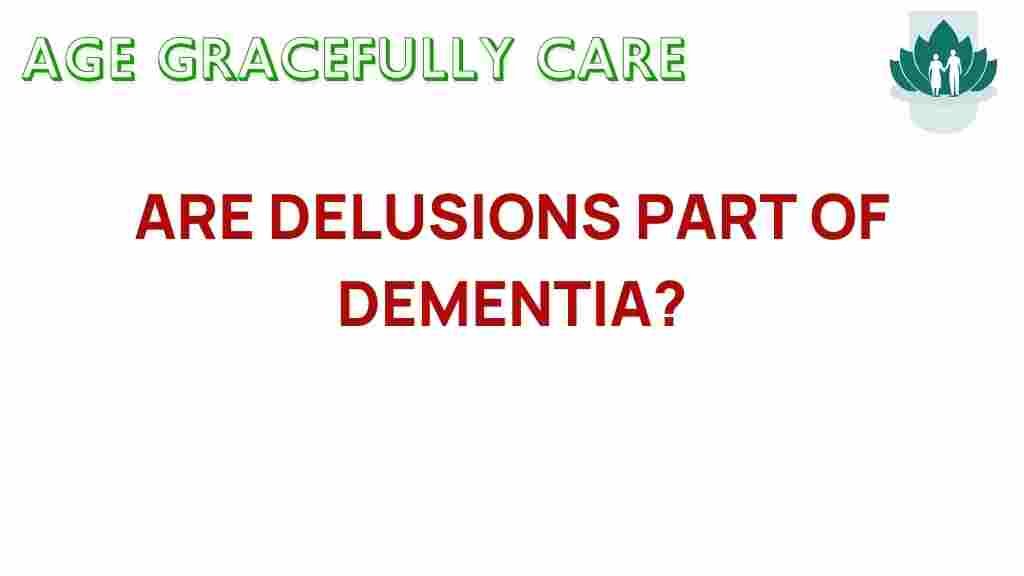Unraveling the Mysteries: Are Delusions a Sign of Dementia?
Dementia is often misunderstood, with many people failing to recognize its complex symptoms and variations. Among these symptoms, delusions are particularly alarming and can significantly affect the quality of life for both patients and their caregivers. In this article, we will delve deep into the relationship between delusions and dementia, particularly in the context of cognitive decline, mental health, and patient care.
Understanding Dementia and Delusions
Dementia is an umbrella term that encompasses various neurodegenerative disorders, including Alzheimer’s disease. It is characterized by a deterioration of cognitive function, which can lead to significant changes in behavior and mental health. As the brain ages or is affected by disease, individuals may experience a range of symptoms, one of which can be delusions.
Delusions are defined as false beliefs that are resistant to reason or confrontation with actual fact. For individuals experiencing cognitive decline, these delusions can manifest in various ways, leading to confusion, fear, and distress.
The Link Between Dementia and Delusions
Research indicates that delusions are not uncommon in patients with dementia. In fact, as cognitive decline progresses, the likelihood of experiencing delusions increases. Here’s how they are connected:
- Cognitive Impairment: As the brain’s cognitive functions decline, individuals may struggle to differentiate between reality and their distorted perceptions.
- Emotional Distress: The emotional changes associated with dementia may lead to feelings of paranoia or fear, contributing to the development of delusions.
- Environmental Factors: An unfamiliar environment or changes in routine can exacerbate feelings of confusion and lead to delusional thinking.
Common Types of Delusions in Dementia Patients
Delusions can take many forms in individuals with dementia. Some common types include:
- Paranoia: Patients may believe that others are trying to harm them or steal from them.
- Misidentification: This includes the belief that familiar people have been replaced by impostors.
- Delusions of Infidelity: Often seen in Alzheimer’s patients, this involves the unfounded belief that a spouse or partner is being unfaithful.
Step-by-Step Process to Address Delusions
If you suspect that a loved one is experiencing delusions associated with dementia, it is crucial to address the situation effectively. Here’s a step-by-step process to help manage these symptoms:
1. Observation
Monitor the individual’s behavior closely. Take note of any patterns in their delusions, such as:
- What specific delusions are they experiencing?
- When do these delusions occur? (e.g., time of day, specific situations)
- How do they react to others when they express these beliefs?
2. Consultation with Healthcare Professionals
It’s essential to consult with healthcare professionals specializing in dementia and mental health. They can provide a proper assessment of the situation and recommend appropriate interventions.
3. Creating a Calm Environment
Adjust the living environment to reduce confusion and stress. Consider the following:
- Maintain a consistent routine to foster a sense of security.
- Minimize clutter and distractions in the living space.
- Use familiar objects and photographs to promote a sense of normalcy.
4. Validation and Reassurance
When a patient expresses delusional thoughts, validating their feelings while gently redirecting the conversation can be helpful. Use reassuring language and focus on their emotions rather than the delusion itself.
5. Medication Management
In some cases, medication may be necessary to manage delusions effectively. Consult with a healthcare provider about:
- Potential medications that can help alleviate psychological symptoms.
- Regular monitoring of the patient’s response to any prescribed treatments.
Troubleshooting Tips for Caregivers
Caring for someone with dementia and delusions can be challenging. Here are some troubleshooting tips to help caregivers manage the situation more effectively:
- Stay Informed: Educate yourself about dementia and its psychological symptoms to better understand what your loved one is experiencing.
- Patience is Key: Remain patient and calm, even when faced with distressing delusions. Your demeanor can significantly impact the patient’s emotional state.
- Engage in Activities: Encourage participation in activities that promote cognitive engagement, such as puzzles, music, or simple games.
- Seek Support: Don’t hesitate to reach out for support from other caregivers or professionals in the field of elderly care.
Conclusion
In summary, delusions can indeed be a sign of dementia, particularly as cognitive decline progresses. Understanding the interplay between dementia and delusions is crucial for effective patient care and improving the quality of life for both patients and caregivers. By observing symptoms, consulting healthcare professionals, creating a supportive environment, and employing effective communication strategies, caregivers can help manage these challenging psychological symptoms.
It’s important to remember that every patient is unique, and delusions can vary widely among individuals with dementia. For more detailed information on dementia care, you can visit this resource. Additionally, if you’re looking for local support groups or professional help, consider reaching out to Alzheimer’s Association for guidance.
As we continue to unravel the mysteries of dementia, let us strive to provide compassionate and informed care to those affected by this complex condition.
This article is in the category Health and created by AgeGracefullyCare Team
